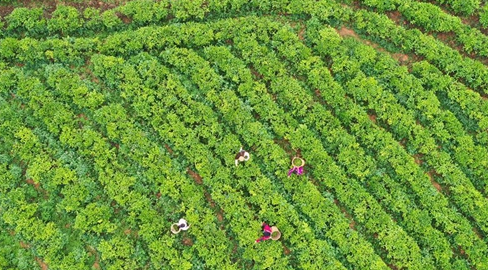
Aerial photo taken on April 23, 2020 shows villagers working at a tea industry demonstration park in Mewo Village in Zhelang Township of Longlin Various Nationalities Autonomous County, south China's Guangxi Zhuang Autonomous Region. The county has been actively promoting the development of tea industry to help locals shake off poverty and increase income. (Photo: Xinhua)
Livestreaming has boosted sales of "anti-poverty" products during the COVID-19 pandemic, an official with China's anti-poverty task force said Friday, shining a light on the nation's innovative approach to poverty eradication that leverages its digital prowess.
Livestreaming plays an important role in poverty relief by expanding channels for impoverished citizens to increase their income as well as acquainting city dwellers with green farm produce from the poorer parts of the country, Chen Hongbo, an official with the State Council Leading Group Office of Poverty Alleviation and Development, told a press conference on Friday.
This "livestream commerce" has become an important part of consumption-powered poverty reduction efforts, Chen said.
By the end of 2019, 93 million people, or 97 percent of impoverished citizens in China, had been lifted out of poverty, Chen revealed. The other four main approaches spearheaded by the Leading Group Office of Poverty Alleviation and Development are government procurement, coordinated poverty eradication efforts between the eastern and western parts of the country, anti-poverty efforts led by businesses and sales of products via a website run by the leading group office, according to the official.
Livestreaming is set to play a bigger role in driving sales of specialty agricultural products in poor rural areas in the future, Yu Shaoxiang, an expert on poverty relief legislation with the Chinese Academy of Social Sciences (CASS) in Beijing, told the Global Times on Friday.
This newly emerging method is not just about boosting sales and local farmers' earnings, but also the digitalization of life in poverty-stricken areas, a way to help them reap the benefits of the digital economy, Yu said.
Since 2019, many rural content creators have been posting videos on short-video platforms like Douyin and Kuaishou about farming, agriculture and village life, generating profits to pad their own pockets.
During his inspection tour of the village of Jinmi in Zhashui county, Northwest China's Shaanxi Province, Chinese President Xi Jinping hailed the role of e-commerce in poverty alleviation and rural vitalization, the Xinhua News Agency reported. The village has been lifted out of poverty thanks to the local black fungus industry.
E-commerce is an emerging business with great potential, which can promote sales of agricultural products, help rural residents shake off poverty and facilitate rural vitalization, President Xi said on Monday.
At the training center of the village located in the Qinling Mountains, Xi talked with villagers who were preparing to market their agricultural products during livestreams, according to Xinhua.
Officials also addressed the issue of poverty relapse, pledging to provide support to regions hardest hit by the COVID-19.
Also, a probe at the end of 2019 into the nation's registered impoverished population that had shaken off poverty and households whose total income hovered marginally above the national poverty line showed that nearly 2 million people had been lifted out of poverty but remained financially unstable while nearly 3 million people fell into the marginal category, he added.
As the CASS expert put it, the coronavirus outbreak has caused some people, who had been lifted out of poverty, to struggle again since virus-prevention measures disrupted the sale and transport of their products.
As of April 10, a total of 280,000 anti-poverty projects had restarted, a work resumption rate of more than 74 percent, said Wu Hua, another official with the State Council Leading Group Office of Poverty Alleviation and Development.
Local anti-poverty efforts in Central China's Hubei Province, the region hardest-hit by the pandemic, have been severely impacted by the onslaught of the virus, Chen stressed, disclosing that numerous supportive measures have been considered to aid Hubei, including providing 800 million yuan ($113 million) for relief efforts in the province and the special purchase of local specialties such as tea and crayfish.
More targeted poverty alleviation measures are needed, Yu noted, while calling for the establishment of a long-term system to better carry out efforts.


